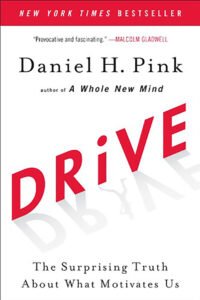Daniel Pink Unpacks the Science of Motivation, Timing, and Decision-Making in an Exclusive Interview

A Bestselling Author on Motivation, Persuasion, and Success
Daniel Pink discusses how his research has evolved, the overlooked power of context, and the role of timing in decision-making, offering compelling insights for individuals and businesses alike.
Daniel Pink stands as a beacon of intellectual insight in the realms of human motivation, timing, and business dynamics. His impressive repertoire of seven bestselling nonfiction books has captivated millions across 46 languages, paving the way for a new understanding of what drives us, both personally and professionally. His works, including the New York Times bestsellers “The Power of Regret,” “A Whole New Mind,” “When,” and the #1 New York Times bestsellers “Drive” and “To Sell is Human,” transcend conventional wisdom and invite readers to view familiar concepts through a new lens. With a career that encompasses hosting a National Geographic television series, delivering one of the top TED talks of all time, and serving as chief speechwriter to Vice President Al Gore, Pink’s influence extends far beyond the pages of his books.
As Mosaic Digest magazine proudly presents our recent conversation with Daniel Pink, we delve into the profound impact of his research and writings. His ability to distill complex scientific ideas into narratives that are both compelling and accessible has not only educated but also empowered a vast audience. Pink’s humility and relentless pursuit of knowledge illuminate his work, reshaping our understanding of motivation as something that includes both grand purposes and the smaller, meaningful contributions of everyday life. His exploration into the art of timing, persuasive communication in the digital age, and the overlooked psychological insights in business offers invaluable perspectives that resonate with us all. In this interview, we celebrate Pink’s enduring legacy and his unwavering commitment to making the intricate dance between science and humanity dance a little more seamlessly.
Your books, particularly Drive and The Power of Regret, challenge conventional wisdom about motivation and decision-making. How have your own views evolved over the years as new research emerges?
My views are always evolving. Let me give you one example. In Drive, I wrote about the importance of purpose as a motivator. And I defined purpose as being connected to a cause greater than yourselves – for example, housing the unhoused or addressing the climate crisis, that sort of thing. But I realized that I had overlooked research showing that a smaller, quieter kind of purpose was also a powerful motivator. It’s the purpose that comes from simply helping out a teammate or solving a customer’s problem — nothing huge and transcendent but localized and meaningful. Purpose is more than making a big difference. It’s also making a small contribution. So now when I talk about purpose as a component of motivation, I talk about it in terms of “capital P” purpose and “small p” purpose–which is the distinction I wish I had made in the book.
In To Sell is Human, you argue that we are all in sales, whether we realise it or not. How do you see this concept playing out in today’s digital age, where persuasion happens across multiple platforms?
It’s even more true today than when I wrote the book. In the digital age, the boundaries between roles and identities have blurred. Whether you’re pitching a new initiative on Slack, posting a thought on LinkedIn, or trying to get your kid to do her homework via text — you’re in sales. You’re trying to move others.
What’s changed is the medium and the scale. Digital platforms have turned us all into broadcasters. An idea you once shared in a meeting now gets posted to a dozen people in a project management app — or a thousand followers online. That raises the stakes for clarity and credibility.
You’ve written extensively about the intersection of science and business. What’s one psychological insight that businesses still tend to overlook, despite strong evidence supporting it?
When we try to explain or predict the behavior of others — whether our employees, bosses, or customers — we tend to overweight the importance of people’s disposition and personality and underweight the importance of the context they are in.
This misjudgment is so common that psychologists have a name for it: the fundamental attribution error. We attribute other people’s behavior to their character, while explaining our own behavior in terms of the situation.
For instance, if a customer service rep seems unhelpful, we might assume she’s lazy or indifferent. But maybe the software she’s using is outdated or the company’s policies tie her hands. Or take employee performance: if someone misses a deadline, we might conclude he’s disorganized. But what if he’s juggling three other urgent projects no one told us about?
Businesses that ignore context miss crucial truths. But organizations that design with context and situations in mind — whether it’s understanding what shapes customer behavior or what enables employees to thrive — make better decisions and create better systems.
Your book When explores the science of perfect timing. Have you made any changes to your daily routine based on what you’ve learned, and what’s one timing-related mistake people commonly make?
Let me take the second part first. The big timing-related mistake people make is that they believe that all times are created equal — that it doesn’t matter so much whether you undertake a task at 10:00 AM or 2:00 PM or 5:00 PM. That’s just wrong. There’s a mountain of evidence showing the time of day has a large — and predictable — effect on our cognitive performance.
Once I understood this research, I changed my own schedule. Because of my chronotype (I’m not an extreme early bird but definitely not a night owl), the best time for me to do my focused, heads-down work is first thing in the morning. So now, when I write, I tackle first thing in the day and do everything I can to minimize distractions during that golden period.
“The job is to honour the complexity without being overly complex — and to translate clearly without dumbing down.” – Daniel Pink
EDITOR’S NOTE
Drive: The Surprising Truth About What Motivates Us by Daniel H. Pink is a compelling exploration of human motivation, challenging the traditional carrot-and-stick approach. Pink offers a fresh perspective with insights into autonomy, mastery, and purpose, backed by extensive research. A transformative read for enhancing performance and satisfaction. Highly recommended!














